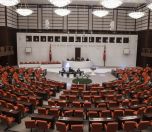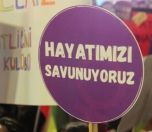* Photo: Anadolu Agency (AA)
Click to read the article in Turkish
Passed by the General Assembly of the Parliament yesterday (April 14), "The Law Foreseeing Amendments to the Law on the Execution of Sentences and Security Measures and Some Laws" has been published on the Official Gazette and entered into force
The law has introduced amendments to 11 different laws including the Law on Execution of Sentences and Security Measures, the Law on Judgeship of Execution, Turkish Penal Code and Code of Criminal Procedure.
After the law has entered into force, convicts have started to be released in İstanbul and Ankara at night.
CLICK - Parliament Passes Law on Criminal Enforcement
Political prisoners, journalists excluded
While the law will enable the release of around 90 thousand convicts amid Covid-19 pandemic, political prisoners, criminals of thought and arrested journalists have not been included in the law foreseeing reduced prison sentences and early release despite the opposition's efforts.
As reported by the state-run Anadolu Agency (AA), aiming to reduce prison population during the pandemic, the law has enabled home confinement for some inmates over 65, women with children aged six and under and ill prisoners who cannot take care of themselves while toughening sentences on those who organize criminal groups for the purpose of monetary profit.
Exceptions in the law on criminal enforcement
In announcing the bill to the public at a press statement on March 31, AKP Parliamentary Group Deputy Chair Cahit Özkan told reporters that "sexual offenses, drug offenses, intentional killing offenses, violence against women and terror offenses had been excluded."
Accordingly, the law that has entered into force stipulates that the sentences of the convicts given 3 years or less in prison on intentional offenses shall be executed in open penal institutions, except for the ones who have been convicted of terror crimes, establishing and leading or being a member of an organization and offenses relating to organizational activities and the offenses committed against sexual inviolability.
The administrative and monitoring board decisions pertaining to the transfer of the above mentioned convicts as well as the ones sentenced to 10 or more years in prison and convicted for willful killing and production and trafficking of drugs from closed penal institutions to open ones will be executed following the verdict of the administrative judge.
When the requests of the above convicts for transfer to an open penal institution, supervised release and release on probation are to be examined by the administrative and monitoring boards, the boards will be chaired by a chief public prosecutor or a public prosecutor to be appointed by him or her.
With the enacted law, the period to benefit from supervised release has been increased from 1 to 3 years. However, these offenses have been excluded:
In terms of offenses committed till March 30, 2020; wilful killing; wilful injury or resulting aggravated injury of lineal kinship, spouses or siblings and the ones not in the physical or mental condition to defend themselves; torture, torment offenses and offenses committed against sexual inviolability; production and trafficking of narcotic and stimulant drugs; and offenses falling within the scope of Anti-Terror-Law (TMK).
Criticism by international rights organizationsReleasing a statement shortly after the bill passed the Parliament yesterday, Amnesty International's Turkey Campaigner Milena Buyum noted that "prison release law would leave innocent and vulnerable prisoners at risk of COVID-19." Buyum briefly said, "Whilst any steps to reduce the chronic overcrowding in Turkey's prisons are welcome, it is deeply disappointing that the tens of thousands of prisoners in pretrial detention - a measure that must only be used when there are no alternatives to custody - will not be considered for release. "Those convicted in unfair trials under Turkey's overly broad anti-terrorism laws are also now condemned to face the prospect of infection from this deadly disease. Sharing some details about the law on criminal enforcement, the organization has also indicated that "the new measures do not allow the release of several categories of prisoner," including the following: "Those held in pretrial detention, i.e. those yet to be convicted of any crime; people convicted under overly broad anti-terrorism laws including journalists, lawyers, political and human rights activists who have been imprisoned merely for speaking out; and even those at heightened risk including older prisoners and those with underlying health conditions convicted under anti-terrorism laws." |
(TP/SD)














-132.jpg)
